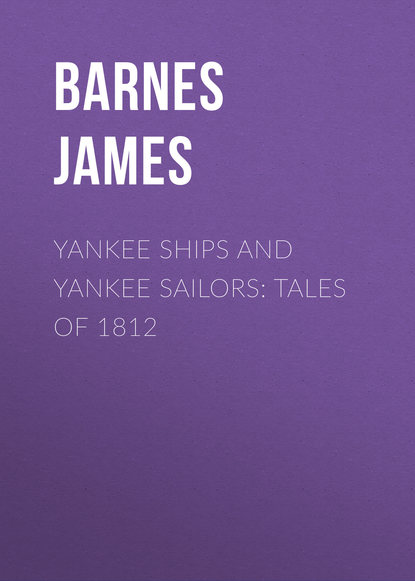По всем вопросам обращайтесь на: info@litportal.ru
(©) 2003-2025.
✖
Yankee Ships and Yankee Sailors: Tales of 1812
Настройки чтения
Размер шрифта
Высота строк
Поля
There followed more signalling. A twelve-oared barge left the flagship for the admiralty pier. From the direction of the town came the sounds of a bugle and the steady thrumming of drums. A long red line trailed by one of the street corners. Already crowds began to gather on the housetops and the water-front. Some clouds formed in the west that looked as if a breeze might be forthcoming. Hull watched the sky anxiously.
The midday meal was served with the men still at their posts. There was no movement made on either side. Toward evening the wind came. No sooner had it ruffled the surface of the water than the Constitution, whose cable had been up and down all the day, lifted her anchor from the bottom, and with her main topsail against the mast, she backed away from her close proximity to her neighbors. Then, turning on her heel, she pointed her bow for the harbor mouth. It was necessary for her to sail past every vessel in the fleet. Drums rolled as she approached. Men could be seen scurrying to and fro, and as she passed by the flagship, a brand-new seventy-four, her three tiers of guns frowned evilly down, and a half-port dropped with a clatter. A sigh of relief went up as the Constitution passed by unchallenged.
There were but three vessels now to pass, – a sloop of war, a large brig, and a forty-four-gun frigate that lay well to the mouth of the harbor. The latter, apparently in obedience to signals, was getting in her anchor and preparing to get under way; but before the Constitution had reached her the breeze died down, and before twilight was over it was dead calm. Hull dropped his anchor, and close beside him, the Englishman dropped his. He was at least two minutes longer taking in his topsails. It continued calm throughout the early watches of the night. At three o'clock in the morning there was a sound of many oars. The officers were on the alert. "They are coming down to attack us in small boats," suggested one of the junior lieutenants. But soon it was perceived that such was not the intention, for in the dim light the big brig could be seen approaching, towed by a dozen boat's crews working at the oars. There was no reason for longer maintaining any secrecy, and Hull called his crew to quarters in the usual fashion. The sounds might have been heard on shore; but the brig, when she had once reached a berth on the American's quarter, dropped her anchor quietly.
With the gray of morning came a new wind from the westward, and with it the Constitution slipped out of port, the two vessels that had menaced her all night long not making a movement to prevent her going. Once well out in the channel, the feeling of suspense was succeeded by one of relief and joy. The fugitive, soaked with bilge water, shivering and hungry, emerged from his hiding-place as he felt the movement of the vessel's sailing.
"How is that man McGovern doing?" asked Captain Hull of Lieutenant Morris, who was dining with him in the cabin. "He ought to be of some use after the trouble and worry he has caused us."
"I'm sorry to say he isn't," responded Morris, shrugging his shoulders. "He isn't worth powder. Why, even the forecastle boys cuff him about and bully him! He not only lacks spirit, but he is one of those men, I think, who are somehow born cowards. But he has been a sailor at some time or other, I take it, although he told me that he was only cook's helper in the galley on board the Poictiers. That's his billet now on board of us, by the way."
It was true: McGovern not only bore the name of a coward, but he looked it, every inch of him. His shifty eyes would lift up for an instant, and then slide away. His elbow was always raised as if to ward off a blow. He acted as if he expected to have things thrown at him. He invited ill treatment by his every look, and he received many blows, and many things were thrown at him. And the unthinking made fun of all this, and used him for their dirty work, and he did not resent it. He took orders from the powder-monkeys, and cringed to the steerage steward. As to the officers and midshipmen, he trembled when they approached him, and after they had passed he would spring forward and hide somewhere, panting, as if he had escaped some danger. The sight of the boatswain deprived him of the power of speech. He acted like a cur that had been whipped, and in fact he lived a dog's life. And yet for this man, those who despised him would have gone to the bottom. Aye, and cheerfully, for behind him lay the question soon to be cause enough for the shedding of much blood.






